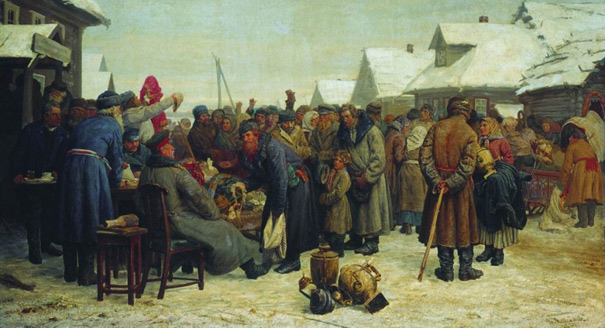The Russian government needs to find ways to increase state revenues, and fast. Although the Kremlin has yet to articulate a comprehensive policy to eliminate or reduce its budget deficit, the government can be expected to take steps that satisfy the financial appetites of elite interest groups but ultimately leave the state in a worse long-term position.
The regime cannot afford to take chances. Confidence in the government is low (less than 29 percent of Russians say they believe what top officials say) and leftist sentiments are taking hold: there is increasing public support for nationalization of private enterprises, limits on foreign trade and investment, and curbing free-market mechanisms.
In this environment, the authorities do not have a mandate for reforms. Maintaining the status quo is their only choice.
As such, the government is likely to try to boost budget revenues without actually reforming its economic and social systems. In order to reduce expenditures, the state will inevitably raise the retirement age as a means of decreasing pension obligations. Spending on healthcare and education will be slashed.
But what other options does it have to make up for a projected $20 to $60 billion shortfall? The most popular policies will be those that establish intermediaries between the taxpayers and the state coffers, thus creating opportunities for graft.
The Kremlin may look to expand the tax base to increase revenues. In light of the current economic malaise, however, the government is unlikely to resort to any extreme expansion. Instead, it may raise taxes on sectors that are heavily financed by the federal budget, increase payments for services like utilities, or eliminate special taxation regimes for income derived from bank deposits and currency exchange transactions.
The government might also pass laws that add to the budget by targeting wealthy segments of society (with loopholes for those with political connections, of course). For example, it could institute progressive taxes on real estate assets, vehicles, and works of art; levy fees on those who possess passports for foreign travel; tax spending abroad; or raise the income tax on the highest-earning 3 or 5 percent of the population. Russians could be taxed for living in the center of the city, owning a house rather than an apartment, or buying top-of-the-line jewelry or designer clothing.
Regional elites who have remained loyal to the central government in exchange for generous subsidies will be told to curb their appetites. If they do not do so voluntarily, they will be compelled to by force. If these budgetary changes are not successful, however, regional leaders can be expected to be used as scapegoats for broader economic problems.
Moscow might simply choose to take money from private citizens by forcing banks into bankruptcy and then nationalizing their assets, making banks convert foreign currency deposits into rubles at a favorable exchange rate, or compelling banks to turn ruble deposits into long-term government obligations or bank bonds.
The government could also seize foreign capital, prohibiting Russian citizens from owning property abroad, and forcing existing assets to be repatriated and converted into rubles. One day, Russia could even revive the practice of court-ordered property confiscation, whereby the government would “legally” seize property from owners who fall out of favor or lose power, and sell it at favorable prices to more loyal and stronger individuals.
Finally, Moscow may attempt to save money on some of the many public services that it currently provides for free or at a heavily reduced price. It could, for example, condition free post-secondary education on participation in a civil or military service system in which graduates are paid meager wages.
The recently announced string of privatizations can hardly be said to be aimed at replenishing the budget. Assets are so cheap and demand for them is so low right now that privatization will at best serve to expropriate minimal sums from out-of-favor oligarchs, redistribute cash from one state-owned company to another, or sterilize assets in bank accounts and non-state pension funds.
Some of the aforementioned measures are one-off solutions. Others will actually reduce long-term revenue streams. What is certain is that contributions to the state budget will decline over the next three or four years, while pressure from Russia’s growing left will increase.
As the leftist parties (the Communist Party, the Liberal-Democratic Party, and Just Russia) begin to sense that the regime is losing support, they will demand populist economic measures, threatening to stop backing the government and chart an independent political course if they are not appeased.
The regime will need to compromise more and more. It will likely increase price controls and regulations on businesses, introduce protectionist measures, de facto nationalize entire sectors, confiscate savings and property, and further restrict cross-border transactions. Russia will be forced into a protracted period of Peronism that may have disastrous consequences for decades.



